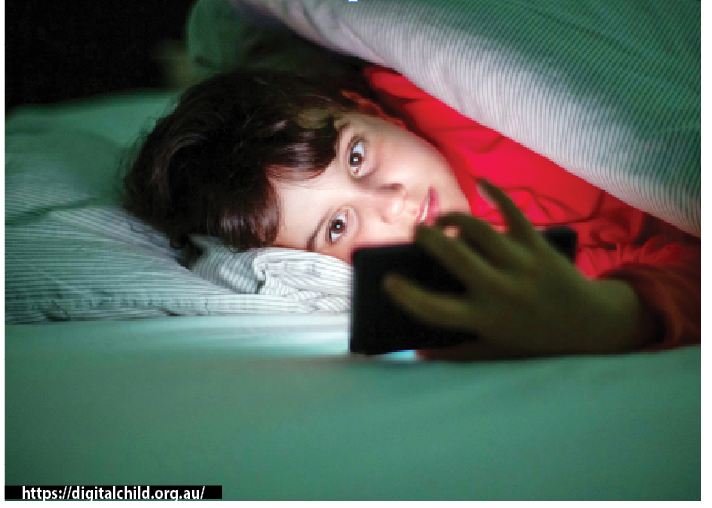In today’s Nigeria, children are growing up in a world dominated by digital devices. From early morning cartoons to late night YouTube binges and endless social media scrolling, screens have become constant companions for many young ones. While technology offers educational and entertainment benefits, it has also quietly introduced new health concerns from disrupted sleep patterns to rising anxiety and reduced attention spans. For many parents, understanding and managing these digital pressures has become a modern-day parenting challenge.
I once interviewed a young banker in Abuja who admitted he hadn’t had a full night’s sleep in months. “After work,” he said, “I unwind with Netflix, then catch up on WhatsApp group chats. Before I know it, it’s 2 a.m.” He laughed as he spoke, but behind the laughter was a familiar reality for many Nigerians: a cycle of stress, digital fatigue, and sleep deprivation, often disguised as productivity or relaxation.
This same pattern is increasingly seen in children whose parents allow unlimited access to screens and digital devices . Late-night gaming, endless videos, and social media scrolling are quietly replacing healthy sleep habits, leaving kids overstimulated and exhausted.
What Is Really Happening To Our Health?
The Sleep Crisis:
The World Health Organisation (WHO) recommends that adults get between 7 to 9 hours of sleep each night for optimal health. However, research shows that using screens before bedtime significantly reduces both the amount and quality of sleep. The blue light emitted by digital devices suppresses melatonin , the hormone responsible for regulating our sleep-wake cycle.
In Nigeria, where long work hours and a relentless hustle culture are common, this creates a harmful cycle: people stay up late on their devices trying to unwind, only to wake up feeling more tired and anxious the next day.
A 2019 study published in the Journal of Global Health Reports found that excessive screen time is linked to a higher risk of insomnia, anxiety, and depression , especially among youth and working adults.
For parents, this is a critical warning: children and teenagers who spend too much time on devices may face serious mental health challenges, making it essential to monitor and manage their screen use from an early age
Unfortunately, digital overuse often disguises itself as a necessity , especially in Nigeria’s bustling urban centers. Schoolchildren attend virtual classes, traders advertise their goods on WhatsApp, and influencers go live even at midnight. In this environment, sleep is no longer treated as sacred, and children’s routines become disrupted by constant digital demands.
Mental Health Implications:
Excessive screen use doesn’t just interfere with sleep; it also takes a toll on mental health.
The World Health Organisation reports that depression affects over 264 million people worldwide. Growing evidence shows that too much screen time is linked to higher rates of anxiety, depression, and difficulty managing emotions, challenges that can be especially tough for children and teens to navigate.
In Nigeria, where mental health remains heavily stigmatized, these problems often go unrecognized or untreated, leaving parents unaware of the emotional struggles their children may be facing until the issues become severe. It’s crucial for parents to be proactive in monitoring their children’s digital habits and encouraging open conversations about mental wellbeing.
Dr. Uchenna Obi, a Lagos-based clinical psychologist, explains that “digital fatigue is one of the most unspoken triggers of anxiety I see in young adults. They’re bombarded with information, comparison, and unrealistic expectations online. It keeps them in a state of constant mental noise.” For parents, this means recognising that children and teens are not just passive users of technology, they are deeply affected by the pressures and distractions of digital life.
So, What Can Parents Do?
Instead of aiming for a total digital detox, which is nearly impossible in today’s connected world here are some practical steps Nigerian parents can take to help their children develop healthier digital habits:
- Digital Curfew:
Set a no-screen time at least 30 minutes to 1 hour before bedtime. Use this time to unwind with a book, prayer, or quiet reflection.
- Blue Light Filters:
Activate night mode or blue light filters on your devices after 7 p.m. It reduces eye strain and improves sleep.
- Scheduled Check-ins:
Rather than mindlessly scrolling, schedule times to check your messages or social media. This keeps digital use intentional.
- Screen-Free Zones:
Designate areas in your home, especially the bedroom and dining area as screen-free zones to encourage presence and human connection.
- Seek Professional Help When Needed:
If anxiety or sleep problems persist, don’t ignore it. Talk to a mental health professional or sleep therapist. Awareness is the first step to healing.
The digital age isn’t going anywhere. It’s transforming how we live, work, and relate but it shouldn’t come at the cost of our mental or physical health.
If Nigeria is to thrive as a nation, we must learn to balance our digital lives with intentional self-care. Sleep isn’t a luxury, it’s an essential health need.
And in a country where access to mental healthcare remains limited, preventing digital burnout is one of the most effective steps we can take.
Let’s start with ourselves: put the phone down tonight, get to bed a little earlier, and reclaim your peace. Your mind, your body, and your future self will thank you.





